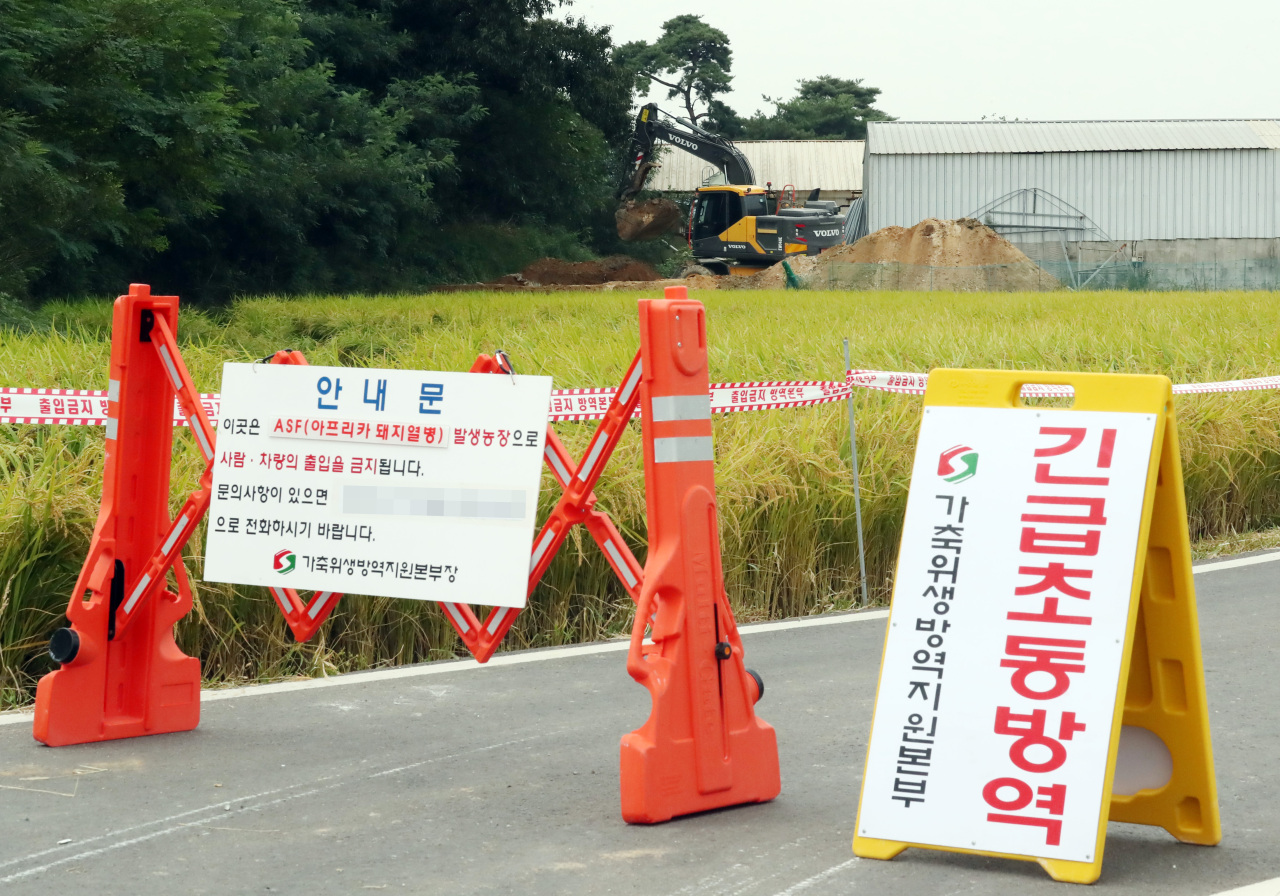South Korea confirmed two more cases of African swine fever on Wednesday, raising the number of disease outbreaks to 11 in just two weeks amid strenuous disinfection efforts across the country.
After a lull for the past four days, the new ASF cases were reported in Paju, north Gyeonggi Province, bordering North Korea, according to the Ministry of Agriculture, Food and Rural Affairs.
The ministry said it is testing another suspected ASF case reported in the same county.

Of the confirmed cases, five have been from Ganghwa Island, northwest of Seoul, and four from Paju, where the country's first-ever highly contagious disease broke out.
So far, all confirmed cases have been reported in areas adjacent to the border with North Korea. Suspected cases from south of Seoul have all tested negative.
Following the new outbreaks, South Korea's agricultural ministry announced a 48-hour lockdown on all farms of Gyeonggi and Gangwon provinces, along with Incheon, effective as of 3:30 a.m.
The ministry also has been banning all automobiles involved in the livestock industry from moving out of the northern areas of Gyeonggi Province.
Concerns have been running high over the further spread of the animal virus as the incubation period of ASF is up to 19 days.
One of the farms confirmed to be affected with ASF on Wednesday had only 18 pigs and was not on the quarantine authorities' watch list, causing concern that some pig farms are not tightly controlled.
The disease is usually spread by contaminated feed, especially leftovers, or by direct contact with people or wild animals with the virus.
Although ASF is not harmful to people, it is fatal to pigs.
There is no current cure, making culling the affected pigs the only viable option to prevent the spread of the virus.
Quarantine officials have been culling pigs within a 3-kilometer radius of infected farms.
The ministry said it had culled about 93,000 pigs as of Wednesday morning. The total number of pigs slaughtered or to be culled is set to exceed 100,000 following the latest outbreaks -- roughly 1 percent of all pigs being raised in the country.
More than half of the pigs in Paju have been culled.
The first-ever case in South Korea came about four months after North Korea reported its first confirmed case of the disease at a farm near its border with China to the World Organization for Animal Health.
South Korea has been struggling to find what has brought the virus into the country, with possibilities including contaminated wild boars or water from the North.
Quarantine authorities have been on high alert because of Typhoon Mitag, which is expected to bring heavy rain and strong winds to southern parts of the country this week. Heavy rains may hinder quarantine operations as they clean away disinfectants already spread on the ground near pig farms and related facilities.
The ministry said it would immediately reapply disinfectants to local pig farms as soon as the typhoon moves out of the country. (Yonhap)







![[KH Explains] Hyundai's full hybrid edge to pay off amid slow transition to pure EVs](http://res.heraldm.com/phpwas/restmb_idxmake.php?idx=644&simg=/content/image/2024/04/18/20240418050645_0.jpg&u=20240419100350)







![[From the Scene] Monks, Buddhists hail return of remains of Buddhas](http://res.heraldm.com/phpwas/restmb_idxmake.php?idx=652&simg=/content/image/2024/04/19/20240419050617_0.jpg&u=20240419175937)

![[KH Explains] Hyundai's full hybrid edge to pay off amid slow transition to pure EVs](http://res.heraldm.com/phpwas/restmb_idxmake.php?idx=652&simg=/content/image/2024/04/18/20240418050645_0.jpg&u=20240419100350)

![[Today’s K-pop] Illit drops debut single remix](http://res.heraldm.com/phpwas/restmb_idxmake.php?idx=642&simg=/content/image/2024/04/19/20240419050612_0.jpg&u=)